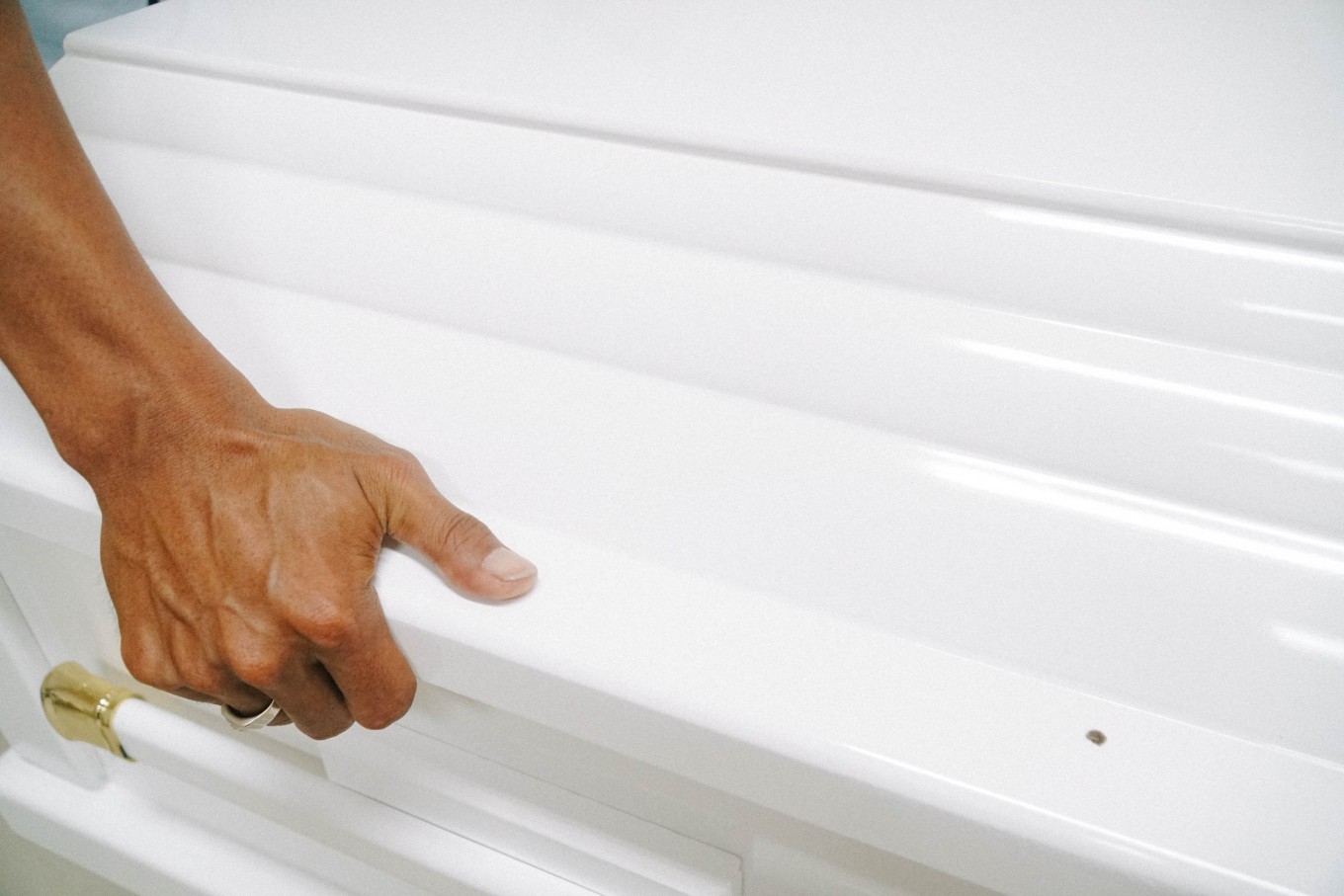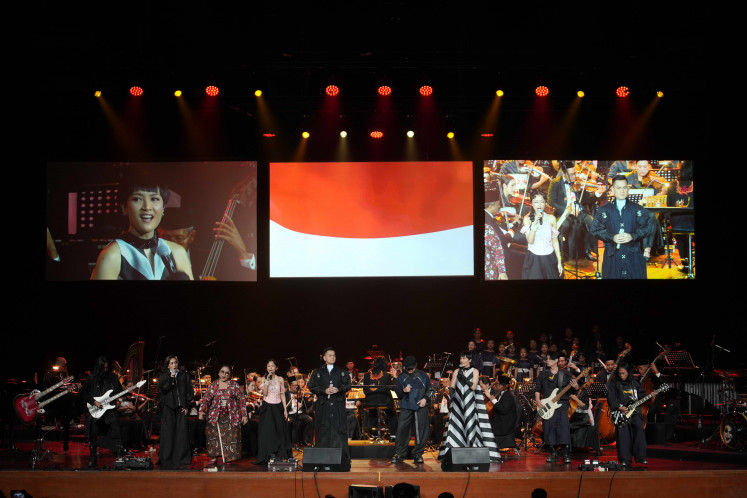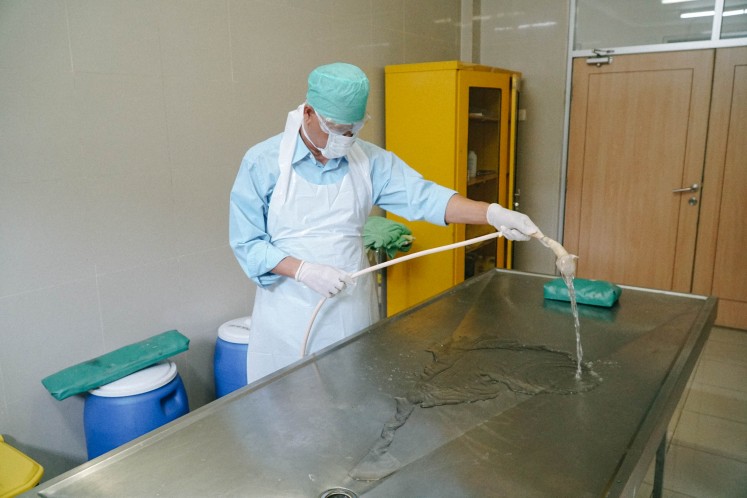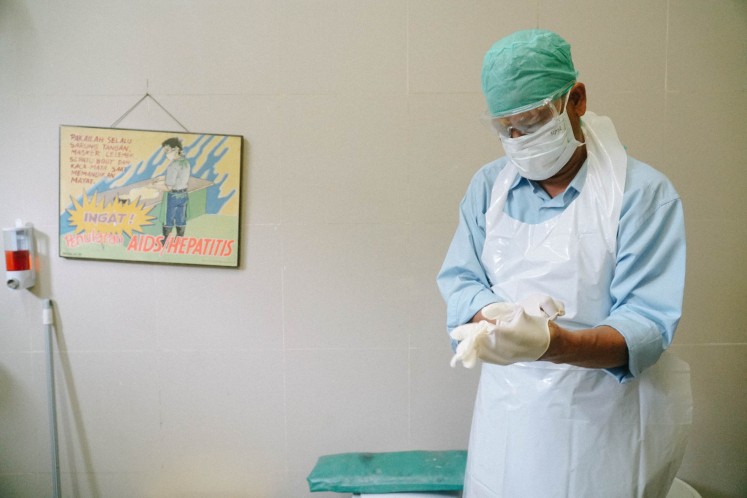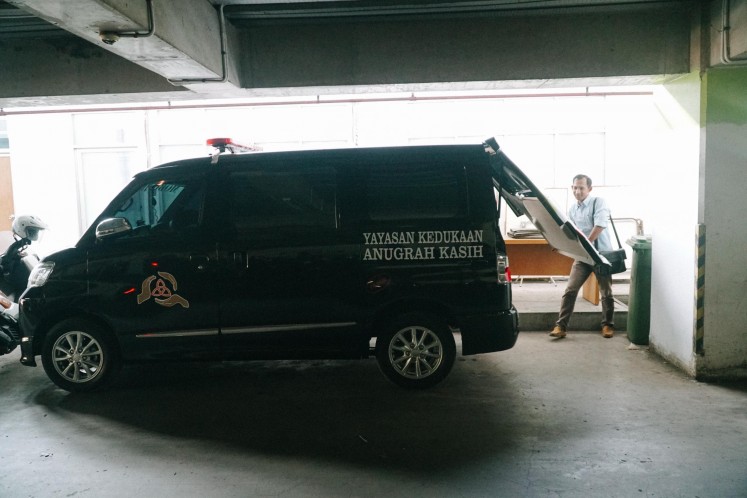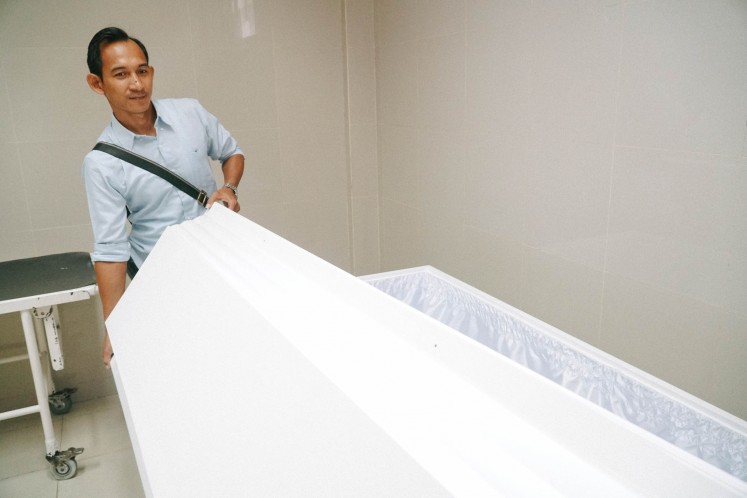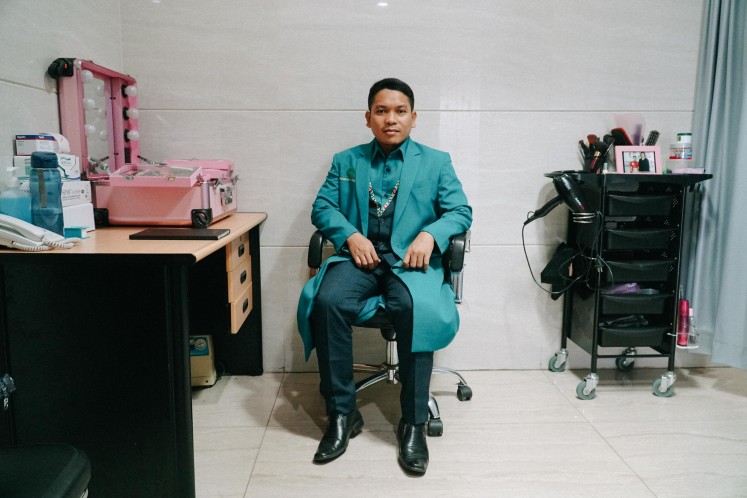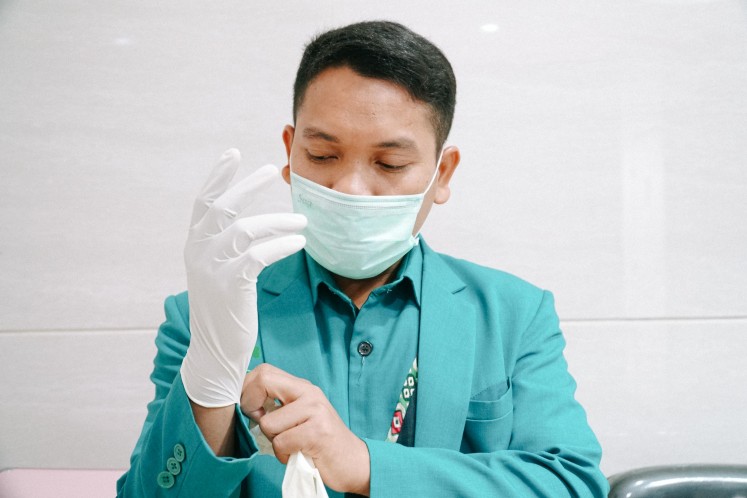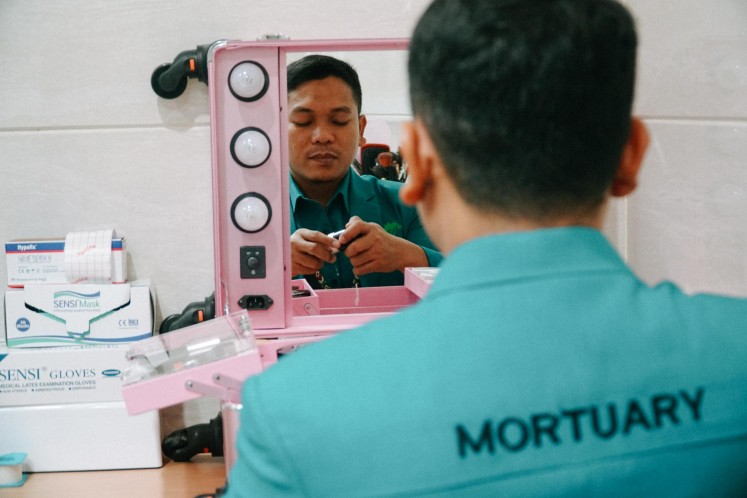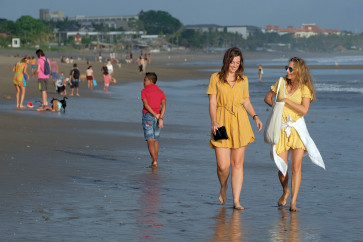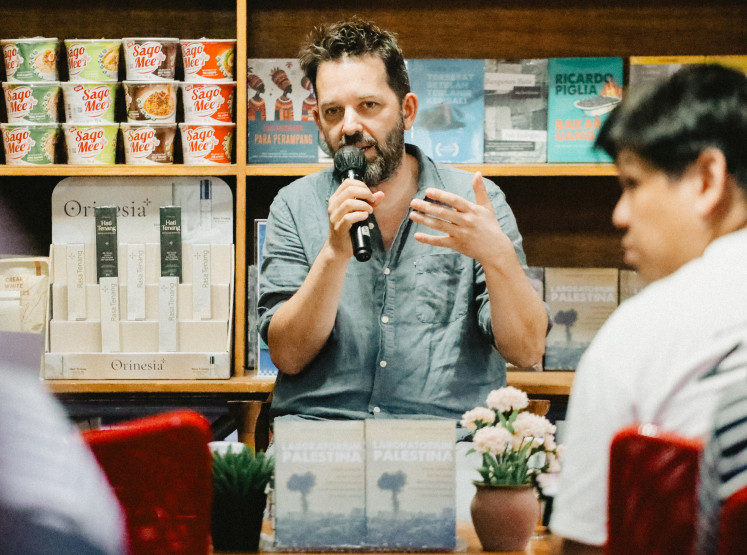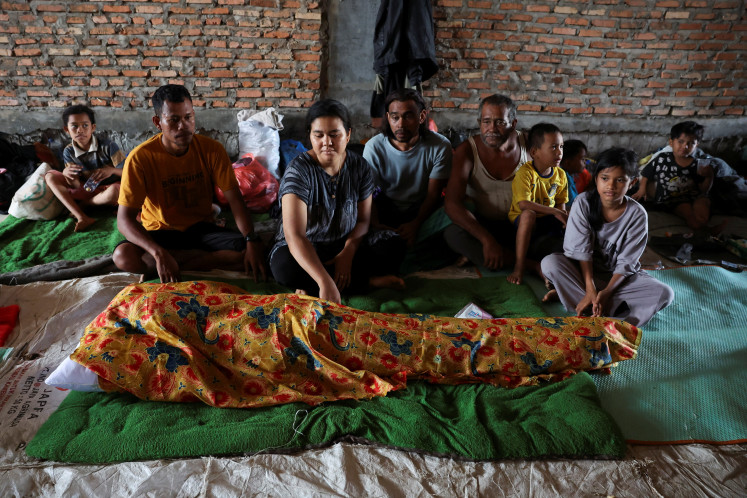Popular Reads
Top Results
Can't find what you're looking for?
View all search resultsPopular Reads
Top Results
Can't find what you're looking for?
View all search resultsMaking a living from the dead: Meet the experts
The Jakarta Post talks to those who help tend the dead and make their living in the death business.
Change text size
Gift Premium Articles
to Anyone
D
espite humanity’s efforts to achieve longevity, death is inevitable. Prior to burial, several steps are traditionally taken, which include bathing the body, putting on a shroud or applying makeup, depending on the religious beliefs of the deceased. The Jakarta Post talks to those who help tend the dead and make their living in the death business.
No place for the faint-hearted
Kasan Hermawan, 53, works in the mortuary at Harapan Kita Hospital, West Jakarta. Kasan works 24-hour shifts, starting at 7 a.m. His job starts whenever a hospital patient has drawn their last breath.
When the mortuary’s phone rings, Kasan will prepare a notification of death form and deliver it to the doctor who will then confirm the patient’s death and sign the form. Prior to transferring the body to the mortuary, according to procedures, the body will be kept in a room for two hours.
Depending on the family’s requests, Kasan will also wash the body and dress it or cover it in a kafan (shroud).
“Everyone can bathe a corpse, as long as they have the courage and willingness. Bathing is considerably easier than [dressing] the corpse," Kasan told The Jakarta Post. He also notes that one needed to be thoroughly prepared before deciding to take on the job. “As long as they don’t run away when they see the corpse, that would mean that they don’t have the right spirit,” he adds.
Mortuary staff member Kasan Hermawan wears complete personal protective equipment (PPE) prior to washing a dead body. (JP/Donny Fernando)Complete protective gear, which includes gloves, a face mask and boots, is mandatory for staff when washing a dead body. “We are required to use personal protective equipment [PPE], which includes a face mask, hair cover, gloves and boots. Although the person has passed away, the bacteria [in the corpse] might still be active. While we're washing the dead body, the bacteria could touch our hands or clothes and when we went home it might infect others,” Kasan explained.
Having worked in the mortuary for 33 years, Kasan admitted that he was scared at the beginning, but as time went by, he saw his job as an opportunity to help others in difficult times. “There is no burden as long as we do our job with sincerity,” he said.
The calling
Jakarta-born Benedictus Budiman had always dreamed of being a Navy officer, but life had its own plans and Budiman’s dream took a sharp turn when he failed the Navy admittance exam. He found a job in a funeral-service company in 2003 and is now the owner of Yayasan Kedukaan Anugrah Kasih, a one-stop funeral service.
Benedictus Budiman checks Yayasan Anugrah Kasih’s hearse in Rumah Duka Harapan Kita, West Jakarta. (JP/Donny Fernando)“No one wanted to do this kind of job. In the beginning, I did not want to do this job. But it’s my calling and God uses me. I feel happy when I can help people during their grieving process,” Budiman said, recalling his first years of work.
He explained that the pressure was intense as he had to master all the funeral-related activities quickly. With help from his mentor Herryanto Setyadi, he managed to learn the ins and outs of the death business.
After working for more than a decade, Budiman established Yayasan Kedukaan Anugrah Kasih, providing various funeral packages. With a starting price of Rp 12.8 million (US$841), the packages include a coffin, transportation services, embalming, bathing, makeup and funeral or cremation arrangements.
“Normally, distraught families are upset and confused [when they are bereaved]. So when they meet a funeral service like [mine], they ask about the total cost, looking for prices that suit their budgets,” Budiman explained.
Yayasan Anugrah Kasih owner Benedictus Budiman shows the inside of a casket. (JP/Donny Fernando)Serving all religions, Yayasan Kedukaan Anugrah Kasih currently partners with several funeral homes, namely Rumah Duka Harapan Kita, Grand Heaven, Rumah Duka Dharmais, Rumah Duka RS PGI Cikini and Rumah Duka Atmajaya.
Working closely with death has taught Budiman lessons in humility, “One day we will die too. [My job] is a lesson in life, you’re not going to take anything with you when you die. You take only what you did for others. What do you want to be proud of? Although you have a lot of money, buildings, factories, when you die and get cremated you will only be a bag of ashes.”
Read also: Two hours of creepiness with The Sacred Riana
Beautifying the dead
Mortuary makeup artist Fakhru Agnia poses with his makeup kits in Rumah Duka Sentosa, Central Jakarta. (JP/Donny Fernando)Corpse makeup artist, Fakhru Agnia sent the Post an instant message, informing that he had to attend a corpse prior to the interview. After waiting for around 15 minutes, Fakhru invited us into the mortuary at Rumah Duka Sentosa in Central Jakarta.
The mortuary was far from intimidating as the room was clean and bright, even with the presence of a corpse covered in a green sheet. Fakhru, who wears a long green coat that could lead some to mistake him for a doctor, ushered us into his workplace.
Fakhru Agnia wears his equipment prior to beautifying a corpse. (JP/Donny Fernando)Working a 24-hour shift daily, mostly on stand-by, Fakhru’s main job is to beautify corpses, or in several cases, restore the corpse’s natural state. He once had to restore a burn victim’s appearance, “The body came with severe burns. I felt responsible to the family.”
Aside from restoration work, in other cases, Fakhru also has to cover up wounds or scars from medical treatment on corpses. “Some people may have wounds from being on a ventilator for a long time. It’s hard to put make-up on the wounds, I usually very carefully dry them using a hairdryer,” he explained.
According to Fakhru, there is no special beauty kits for corpses. He just uses local and international brands of cosmetics normally used by the living. “Cosmetic [products] are actually similar to those [I] use for living people. Here, I offer both local and [international] makeup brands. But the technique is different. [We need to] do it slowly and carefully,” Fakhru said.
Fakhru said that as a mortuary makeup artist, he always tried to make the corpses look as natural as possible.
“We usually ask when the body will be buried or cremated,” he said, explaining that in several conditions, the makeup on the corpse needs to last for days.
“I also touch up the makeup as the face might have dark spots or wrinkles after a few days,” he said.
Fakhru Agnia prepares his makeup kits at Rumah Duka Sentosa in Central Jakarta. (JP/Donny Fernando)Fakhru’s skillful post-mortem beautification of their departed loved one can cost the bereaved family Rp 1 million for local cosmetics or Rp 2 million for the use of international-brand cosmetics.
When not dealing with the dead, Fakhru works for the living, “I’m actually a makeup artist. I also do makeup for television shows, weddings and models.” After a decade of working as a mortuary makeup artist, he can firmly say that the job is no walk in the park. “Being a mortuary makeup artist is a very hard job. Personally, I think it’s [easier] to do makeup for living people, brides or celebrities than corpses.”
In a month, Fakhru handles about 50 corpses on average. However, lucrative the business may seem, Fakhru sees beyond the monetary value, "I actually don’t see it from a commercial point of view. I just feel the job is more challenging.” He was attracted to the job since he realized that there were not too many mortuary makeup artists, “Most people are scared of [doing this job],” he added.
To inform the family about the corpse’s condition, Fakhru also makes it a point to take before-and-after photos. “These are the pictures,” he showed the Post a tablet computer filled with before-and-after photos. The makeup artist said that he had never had a complaint from the families about his work. (asw)

